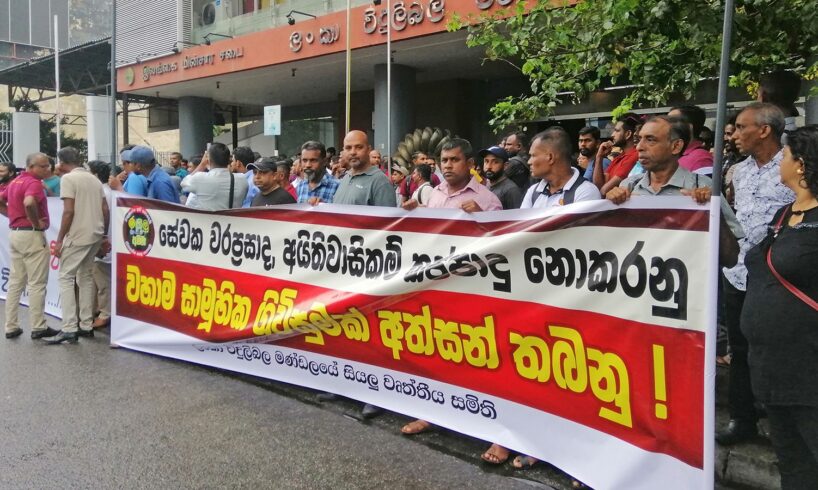
Sri Lankan President Anura Kumara Dissanayake imposed essential service orders on state-owned Ceylon Electricity Board (CEB) effective from Sunday midnight to suppress the weeks-long struggle of CEB workers against restructuring and in defence of their jobs and conditions.
CEB workers protesting in front of head office in Colombo on September 17, 2025.
On Tuesday, his Janatha Vimukthi Peramuna/National People’s Power (JVP/NPP) government cancelled leave for all CEB workers until further notice—a move aimed at blocking any sick-note stoppage.
According to Sunday’s gazette notification issued by Dissanayake, all electricity supply services are declared essential. This anti-democratic measure allows the government to ban industrial action by electricity workers.
Non-compliance can lead to a summary magistrate’s trial, with guilty individuals facing two to five years of rigorous imprisonment, a fine between 2,000 rupees and 5,000 rupees, or both. Campaigning for such industrial action is also an offence, punishable by the same penalties.
The Socialist Equality Party (SEP) calls on all sections of the working class to condemn the JVP/NPP government’s repressive measures against CEB workers, and urges everyone to stand in their defence.
Since September 4, some 20,000 CEB workers have been involved in a work-to-rule campaign against restructuring as part of the IMF austerity program. On September 17–18, workers joined a sick-note campaign and held powerful protests outside the CEB head office in Colombo.
Leaders of the Joint Alliance of CEB Trade Unions (JACEBTU), which have called the current limited action, initially boasted that they would not comply with the essential service order. They declared the unions would intensify their campaign if the authorities failed to provide “satisfactory solutions” to their demands.
However, the CEB union bureaucrats did a rapid about-face and bowed down to the government’s orders. Yesterday evening, JACEBTU announced that it had decided to temporarily suspend a scheduled strike for today, citing the offer of a meeting with the government labour commissioner and a meeting with the country representative of the International Labour Organisation. Only the ongoing work-to-rule campaign will continue.
The CEB union leaders only called those limited actions to contain widespread anger among workers over the government’s refusal to protect their rights, including their jobs. The unions, however, have deliberately kept CEB workers isolated and refused to mobilise other workers to defend them against government repression, thus leaving them more vulnerable to the government’s attacks.
Dissanayake’s new moves to suppress the CEB workers’ struggle has the support of the entire political establishment. Yesterday, the parliament approved the president’s essential service order without debate as the leaders of all parliamentary parties had given their approval the previous day.
Last week Power and Energy Minister Kumara Jayakody declared that any CEB worker who did not agree to the restructuring could resign under the voluntary retirement scheme. On September 17, President Dissanayake warned CEB workers that no one would be allowed to obstruct the government’s “progressive economic transformation”—in other words, the IMF’s harsh austerity agenda.
Just one year after coming to power, Dissanayake has declared war on electricity workers. This is a warning to all workers, who are being pushed into struggle by the government’s implementation of the IMF diktats. The president’s invocation of the essential services act is a declaration of war against the working class as a whole.
The JVP/NPP government came to power last year under conditions of deep economic and political crisis by exploiting the immense popular opposition to the traditional parties of bourgeois rule. It put forward a raft of election promises claiming it would renegotiate the terms of the country’s IMF bailout loan, protect democracy and improve the living conditions of the masses. Once in office, Dissanayake quickly tore up his pledges including to renegotiate the IMF’s terms.
As well as state repression, the government is using the unions against CEB employees. On September 22, the JVP-controlled Ceylon Electricity Workers Union (CEWU) distributed a leaflet titled “What will happen to the Electricity Board.” It denounced the struggle of CEB workers as “a conspiracy by defeated, corrupt political groups” and defended CEB’s restructuring as a means to eliminate corruption and fraud.
The CEWU leaflet concealed the fact that the government’s restructuring is fully in line with IMF directives to divide the CEB into four companies, paving the way for their eventual privatisation. Workers’ jobs, salaries and working conditions will be slashed to boost profits.
The SEP urges all workers to oppose the government’s attempt to demonise CEB workers and to see their struggle as inspiration to oppose the relentless attacks on their democratic and social rights. The government is not fighting corruption but carrying out the IMF’s orders, including the decision to raise electricity tariffs further by 7 percent.
There are two main reasons why the Dissanayake government is attacking CEB workers. Firstly, the government is strictly bound by IMF directives and faces being denied the next instalment of the IMF loan if it fails to fully carry them out.
Secondly, Dissanayake fears that if the CEB struggle continues it will encourage other sections of workers to oppose the IMF austerity measures that are devastating living standards.
The JVP trade unions have a history of sabotaging and betraying workers’ struggles including in the CEB. In 1996, for instance, the government of President Chandrika Kumaratunga used the essential services act to crush a strike by CEB workers against privatisation and to rectify salary anomalies.
The JVP trade union leaders declared that the strike would help the opposition UNP, and scabbed. Many of its members, however, joined the strike. Now a similar smear is being used to justify the JVP/government’s repression: that the CEB industrial action is a conspiracy by “old defeated and corrupted politicians”. Just prior to last year’s presidential election, top JVP union leader Lal Lantha insisted that the JVP unions suppress all industrial action as it would hamper the party’s election campaign. Now a minister in the government, Lal Lantha and other JVP leaders branded strikes against the IMF’s austerity as a threat to economic recovery—in reality, a threat to corporate profits and Sri Lankan capitalism.
The decision by the other CEB unions to capitulate to the government’s essential service orders once again demonstrates their treacherous role in sabotaging a genuine struggle to defend the basic social and democratic rights of workers. All of these pro-capitalist unions support the IMF-dictated restructuring of the CEB, like the opposition parties with which many of them are affiliated. Their appeal is for negotiations on how the restructuring is implemented.
The SEP calls on CEB workers to take matters into their own hands and form action committees, independent from the union bureaucracies and bourgeois parties, at every CEB workplace. Only in that way can workers democratically discuss and implement a genuine industrial and political campaign to fight for their interests.
CEB workers need to turn to other sections of the working class facing similar attacks for support and to prepare a joint struggle against the government’s ruthless implementation of austerity measures.
Workers and the poor cannot defend their basic rights within the framework of the capitalist system. The declaration of war by the Dissanayake government against the CEB workers highlights the need for the unified political movement of the working class—Sinhala, Tamil and Muslim—based on a socialist perspective.
This must include the nationalisation of the major corporations, banks and plantations under workers’ democratic control, and the bringing to power of a workers’ and peasants’ government to implement such measures. We call on workers and youth who want to fight for this perspective to join the SEP.
Sign up for the WSWS email newsletter





